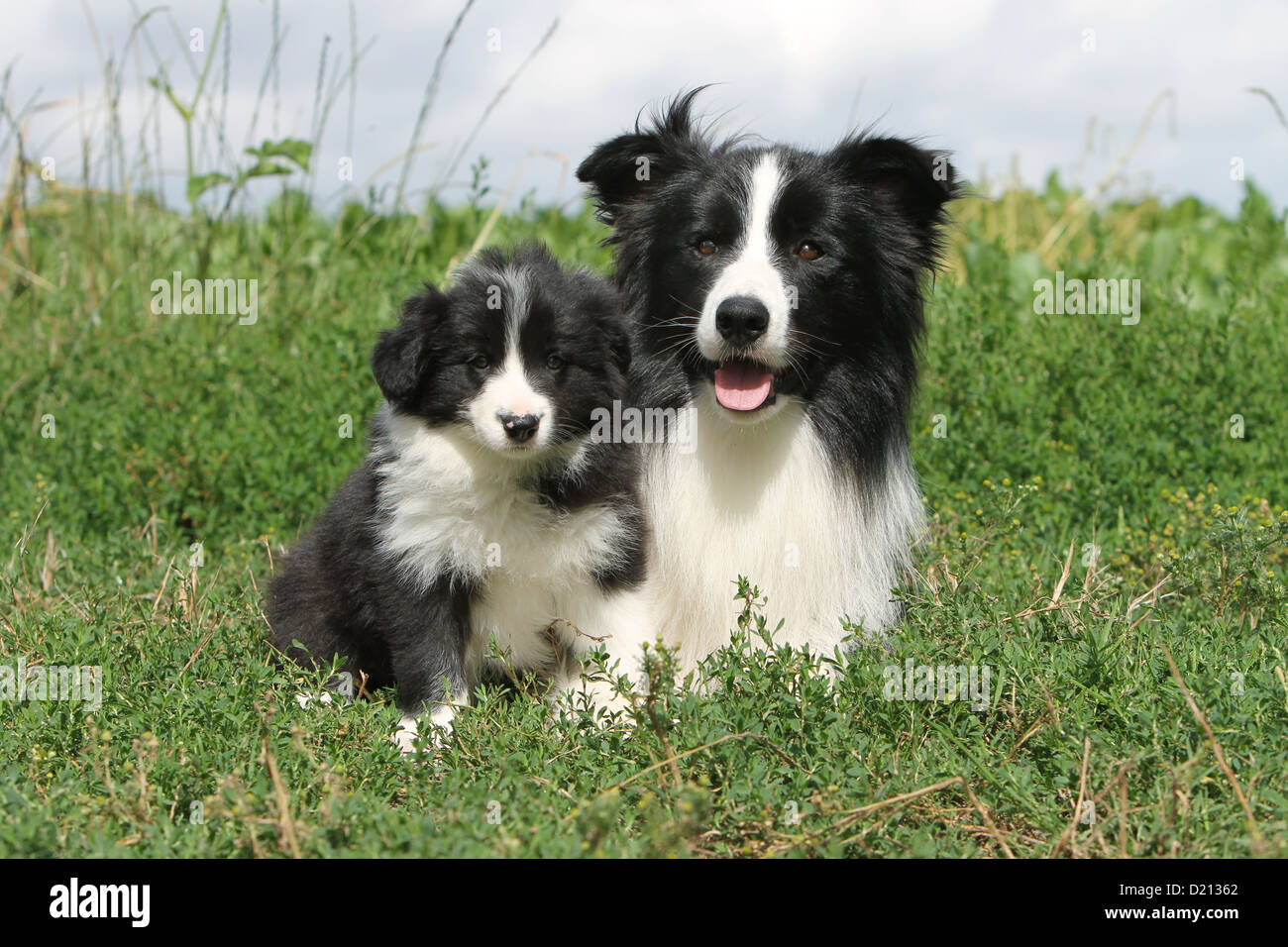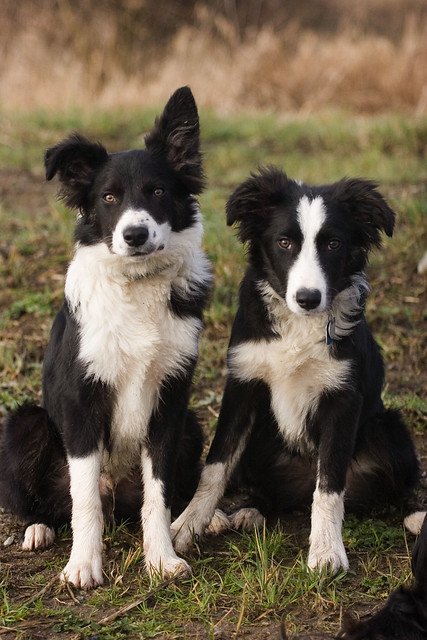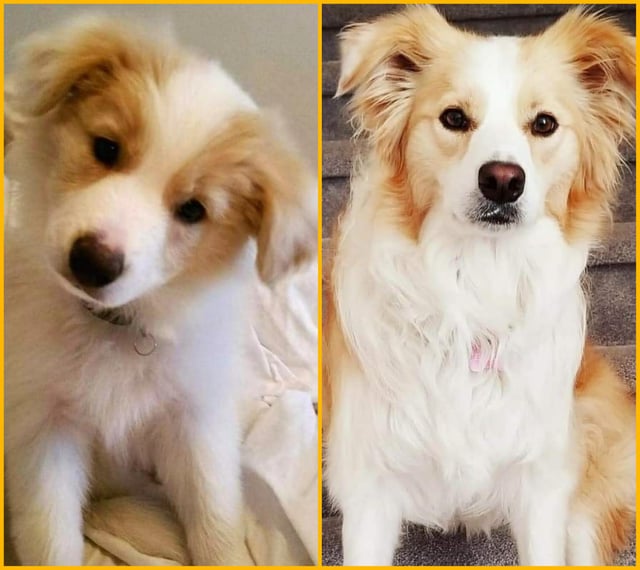Border Collies are known for their intelligence and energy. Whether you have a playful puppy or a mature adult, these dogs make wonderful companions.
Raising a Border Collie is a rewarding experience. Puppies are full of energy and curious about everything. They need lots of attention and training. As they grow, their needs change. Adults are calmer but still active and smart. They need mental and physical exercise.
Understanding the differences between a Border Collie puppy and adult helps you provide the best care. This guide will explore how to meet the unique needs of both stages. Whether you are planning to adopt or already have a Border Collie, this information will help you make informed decisions for a happy, healthy dog.

Credit: www.alamy.com
Choosing A Border Collie Puppy
Border Collie puppies grow into active and intelligent adults. Early training helps them develop strong skills and good behavior. Active families benefit most from their energy and need for exercise.
Selecting the right Border Collie puppy is a big decision. You need to consider many factors before making your choice. Each puppy has its own unique traits and needs.Selecting A Breeder
Find a reputable breeder for your Border Collie puppy. Good breeders care about their dogs’ health and happiness. They will provide a clean environment for the puppies. Ask the breeder about the puppy’s parents. This can give you insight into the puppy’s future behavior and health.Health Considerations
Border Collies need to be healthy from the start. Check if the puppy has had its vaccinations. Ask about any genetic tests done on the parents. This can help avoid future health issues. Look for signs of a healthy puppy. Clear eyes, a shiny coat, and playful behavior are good signs. Choosing a Border Collie puppy involves careful thought. The right puppy will bring joy and energy to your home. “`Credit: www.dogfoodchat.com
Preparing Your Home
Bringing a Border Collie into your home is an exciting journey. Whether you have a playful puppy or a mature adult, preparation is key. Your home should be safe and welcoming for your new furry friend. This guide helps you get ready for your Border Collie.
Puppy-proofing
Puppies are curious and love to explore. Make sure to remove hazards. Keep electrical cords out of reach. Secure loose items that could be chewed or swallowed. Block off areas that are unsafe or off-limits. Cover trash cans and secure cabinets. Puppies can get into anything. Think about what they can reach and remove it.
Essential Supplies
Ensure you have all needed supplies for your Border Collie. A sturdy leash and collar are must-haves. Get a comfy bed that fits your dog’s size. Bowls for food and water are essential. Consider stainless steel for easy cleaning. Stock up on high-quality dog food. Puppies and adults have different dietary needs. Buy age-appropriate food for your Border Collie.
Chew toys are a great way to keep your dog entertained. They help with teething for puppies and dental health for adults. Get a variety of toys to keep them busy. Grooming supplies are also important. A good brush keeps their coat healthy. Border Collies shed, so regular grooming is necessary.
Puppy Training Basics
Training a Border Collie puppy can be rewarding. These intelligent dogs learn quickly. Starting early ensures good habits. Focus on housebreaking and socialization. This sets a strong foundation for their future behavior.
Housebreaking Tips
Housebreaking a Border Collie puppy requires patience. Set a routine for bathroom breaks. Take the puppy outside after meals and naps. Praise them for going in the right spot. Consistency is key. Crate training can help. Puppies avoid soiling their sleeping area. Keep the crate in a common area. This way, the puppy feels included. Use positive reinforcement. Treats and praise work best. Avoid punishment. It can cause fear and confusion. Clean up accidents immediately. Use pet-safe cleaners. This removes odors and prevents repeat accidents.
Socialization
Socializing your Border Collie puppy is crucial. Introduce them to different people and environments. This builds confidence and reduces fear. Start with family and friends. Gradually include strangers. Visit parks and pet-friendly stores. Expose them to various sounds and sights. Other pets are important too. Arrange playdates with other dogs. Supervise these interactions. This prevents negative experiences. Enroll in puppy classes. These provide structured socialization. They also offer basic obedience training. The earlier you start, the better. A well-socialized puppy grows into a well-adjusted adult.
Nutrition And Diet
Border Collies are known for their intelligence and energy. Proper nutrition and diet are vital for their health. Whether you have a puppy or an adult dog, their dietary needs differ. This guide provides clear feeding instructions for both stages of their life.
Puppy Feeding Guide
Border Collie puppies grow quickly and need a balanced diet. Their food should include proteins, fats, and carbohydrates. Puppies require more calories than adults due to their growth and energy needs.
| Age | Meals per Day | Portion Size (per meal) |
|---|---|---|
| 8-12 weeks | 4 | 1/4 to 1/2 cup |
| 3-6 months | 3 | 1/2 to 1 cup |
| 6-12 months | 2 | 1 to 2 cups |
Choose a high-quality puppy food. Ensure it has essential nutrients like DHA for brain development. Avoid foods with artificial additives. Fresh water should always be available.
Adult Dog Nutrition
Adult Border Collies need a diet that supports their activity level. They need lean proteins, healthy fats, and complex carbohydrates. Their diet should also include vitamins and minerals.
- Proteins: Chicken, beef, fish
- Fats: Fish oil, flaxseed
- Carbohydrates: Brown rice, sweet potatoes
Feed your adult Border Collie 2 meals a day. Adjust portion sizes based on their activity level. Working or highly active dogs may need more food.
Avoid overfeeding to prevent obesity. Regularly monitor their weight and adjust portions as needed. Fresh water should always be available.
Consult with your veterinarian for personalized advice. They can recommend the best diet based on your dog’s health and activity level.
Exercise Needs
Border Collies are known for their intelligence and high energy levels. Understanding their exercise needs is essential. Proper exercise keeps them healthy and happy.
Daily Routine
Border Collies need regular physical activity. A combination of walks, runs, and playtime is ideal. Aim for at least two hours of exercise each day. Split this into morning and evening sessions.
During walks, let your dog explore and sniff around. This provides both physical exercise and mental stimulation.
Here’s a simple daily routine:
| Time | Activity | Duration |
|---|---|---|
| Morning | Walk/Run | 30-45 minutes |
| Afternoon | Playtime (fetch, tug-of-war) | 15-30 minutes |
| Evening | Walk/Run | 30-45 minutes |
Mental Stimulation
Border Collies are highly intelligent. They need mental challenges to stay sharp. Mental stimulation is as important as physical exercise.
Here are some activities that can help:
- Training sessions: Teach new commands or tricks.
- Puzzle toys: These keep your dog’s brain active.
- Interactive games: Hide-and-seek or obstacle courses.
Training sessions should be short and fun. Border Collies enjoy learning new things. Use positive reinforcement to encourage them.
Rotate toys to keep your dog engaged. New toys can spark interest and challenge your dog.
Mental stimulation prevents boredom. A bored Border Collie can develop behavioral issues. Keeping their mind busy is key to a well-rounded, happy dog.
Grooming Essentials
Grooming your Border Collie, whether puppy or adult, is crucial. Their double coat needs regular care to keep it healthy and shiny. Proper grooming also helps reduce shedding and prevents matting. Let’s dive into some grooming essentials.
Brushing Techniques
Border Collies have a double coat. A slicker brush works best for them. Brush your Collie at least twice a week. This helps remove loose fur and prevents tangles. Pay extra attention to areas behind the ears and under the legs. These spots tend to mat more often. Use gentle strokes to avoid hurting your dog. Brushing also stimulates blood circulation, promoting a healthier coat.
Bathing Tips
Bathing should be done once every three months. Use a dog-specific shampoo to avoid skin irritation. Before bathing, brush your Collie to remove loose fur. Wet the coat thoroughly and apply shampoo evenly. Rinse well to ensure no shampoo residue remains. Dry your dog with a towel and avoid using a hairdryer on high heat. Too much heat can damage their coat and skin. Always check the water temperature to make sure it’s lukewarm.
Common Health Issues
Border Collies are active and smart dogs. Both puppies and adults can face health issues. Knowing these can help you keep your pet healthy.
Puppy Health Concerns
Border Collie puppies need special attention. Common health concerns include:
- Hip Dysplasia: This affects the hip joint. It can cause pain and lameness.
- Collie Eye Anomaly (CEA): This is an eye problem seen in Collies. It can lead to vision issues.
- Epilepsy: Puppies may have seizures. Early diagnosis is key.
- Puppy Dermatitis: Skin infections are common in young dogs.
Adult Dog Health
Adult Border Collies also face health issues. Some of these are:
- Osteoarthritis: This is a joint disease. It can cause pain and stiffness.
- Progressive Retinal Atrophy (PRA): This eye disease can lead to blindness.
- Hypothyroidism: The thyroid gland does not produce enough hormones. This affects metabolism.
- Deafness: Hearing loss can occur in older dogs.
| Condition | Puppy | Adult |
|---|---|---|
| Hip Dysplasia | Yes | Yes |
| Collie Eye Anomaly (CEA) | Yes | No |
| Epilepsy | Yes | Yes |
| Osteoarthritis | No | Yes |
| Progressive Retinal Atrophy (PRA) | No | Yes |
| Hypothyroidism | No | Yes |
| Deafness | No | Yes |

Credit: boards.bordercollie.org
Transition To Adulthood
Transitioning from puppyhood to adulthood is a significant phase for a Border Collie. This period involves various changes in behavior, training, and overall care. Understanding these changes will help ensure your Border Collie grows into a well-adjusted adult dog.
Behavioral Changes
As your Border Collie puppy matures, you’ll notice shifts in behavior. Puppies are naturally curious and energetic. They explore their surroundings and interact playfully. Adult Border Collies, on the other hand, often become more focused and calm.
Adult dogs may show increased loyalty and protective instincts. They may also develop stronger bonds with their family members. During this transition, it’s essential to monitor changes in their social interactions. Some dogs may become less tolerant of strangers or other animals.
Understanding these behavioral changes can help you adapt your care and training methods. This ensures a smooth transition to adulthood for your Border Collie.
Training Adjustments
Training needs to evolve as your Border Collie grows. Puppy training focuses on basic commands and housebreaking. As they mature, their intelligence and energy levels require more advanced training.
Consider incorporating complex tasks and agility exercises into their routine. These activities help keep their minds sharp and bodies active. Here’s a simple table to illustrate training adjustments:
| Training Phase | Focus Areas |
|---|---|
| Puppy | Basic Commands, Socialization, Housebreaking |
| Adult | Advanced Commands, Agility, Specialized Tasks |
Consistency in training is crucial. Use positive reinforcement techniques to encourage good behavior. Short, frequent training sessions are more effective than long, sporadic ones. Adjust the complexity and duration of the tasks as your dog matures. This keeps them engaged and challenged.
Remember to be patient and understanding. Each Border Collie is unique and may require different training approaches. Adapt and evolve your methods to suit your dog’s individual needs.
Frequently Asked Questions
What Is The Lifespan Of A Border Collie?
A Border Collie’s lifespan typically ranges from 12 to 15 years. Proper care and regular vet check-ups can help them live longer.
How To Train A Border Collie Puppy?
Training a Border Collie puppy requires consistency and patience. Use positive reinforcement techniques and start with basic commands.
Are Border Collies Good With Children?
Yes, Border Collies are generally good with children. They are friendly, energetic, and enjoy playing, making them great family pets.
How Much Exercise Does A Border Collie Need?
A Border Collie needs at least 1 to 2 hours of exercise daily. This includes walks, runs, and playtime.
Conclusion
Border Collies make wonderful pets for active families. Their energy and intelligence shine. Whether a puppy or adult, they need exercise and mental stimulation. Training them early is crucial. They thrive on challenges and learning new tricks. Consistent care and love ensure a happy Border Collie.
They’re loyal, smart, and a joy to have around. Adopting one means having a lifelong friend. Ready for a furry companion? Consider a Border Collie. They bring endless joy and excitement.
